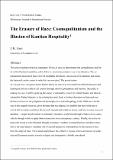Files in this item
The erasure of race : cosmopolitanism and the illusion of Kantian hospitality
Item metadata
| dc.contributor.author | Gani, J. K. | |
| dc.date.accessioned | 2017-07-10T11:30:12Z | |
| dc.date.available | 2017-07-10T11:30:12Z | |
| dc.date.issued | 2017-06 | |
| dc.identifier | 250418862 | |
| dc.identifier | 14c5e4ff-9a08-4c1b-9702-a657929499e9 | |
| dc.identifier | 85024490468 | |
| dc.identifier | 000405448800009 | |
| dc.identifier.citation | Gani , J K 2017 , ' The erasure of race : cosmopolitanism and the illusion of Kantian hospitality ' , Millennium: Journal of International Studies , vol. 45 , no. 3 , pp. 425-446 . https://doi.org/10.1177/0305829817714064 | en |
| dc.identifier.issn | 0305-8298 | |
| dc.identifier.other | RIS: urn:05567B3BDC7814B78AB1A7AC62723585 | |
| dc.identifier.other | ORCID: /0000-0002-8218-1807/work/76387100 | |
| dc.identifier.uri | https://hdl.handle.net/10023/11176 | |
| dc.description.abstract | This article explores three key arguments: Firstly, it seeks to demonstrate the contradictions and limits within Kantian hospitality, and its links to colonialism and practices of racialisation. The acclaimed universalism of Kant's law of hospitality forecloses a discussion of its dualism, and erases the historical, racist context in which it was conceived. The prioritization of concept over conception allows Kant's theory on race to be obscured from official discourse and framing of policies while it still courses through inherited perceptions and theories. Secondly, in making my case, I will be applying the notion of coloniality, coined by Aníbal Quijano and later developed by Walter Mignolo, to the existing but small body of critical discourse on Kant and race. Debates initiated on the peripheries of philosophy, law and anthropology in the 1990s have led the way in this regard. However, given the time that has elapsed, it is notable that their work has received little scrutiny in political theory and International Relations theory, and thus warrants renewed attention. I argue that the notion of coloniality provides a useful lens through which to do so, and a vehicle through which to apply those excavations to a contemporary context. Finally, the article explores the extent to which Kantian thought constitutes 'modern' cosmopolitanism, and draws attention to the inadvertently complicit role of second-generation cosmopolitans in the erasure of race from the study of Kant. The relationship between the collective erasure of race and racism in academia and European practice towards refugees and immigrants is briefly considered. | |
| dc.format.extent | 22 | |
| dc.format.extent | 260861 | |
| dc.language.iso | eng | |
| dc.relation.ispartof | Millennium: Journal of International Studies | en |
| dc.subject | Kant | en |
| dc.subject | Race | en |
| dc.subject | Hospitality | en |
| dc.subject | B Philosophy (General) | en |
| dc.subject | H Social Sciences (General) | en |
| dc.subject | HT Communities. Classes. Races | en |
| dc.subject | JA Political science (General) | en |
| dc.subject | T-NDAS | en |
| dc.subject | BDC | en |
| dc.subject | R2C | en |
| dc.subject | SDG 16 - Peace, Justice and Strong Institutions | en |
| dc.subject.lcc | B1 | en |
| dc.subject.lcc | H1 | en |
| dc.subject.lcc | HT | en |
| dc.subject.lcc | JA | en |
| dc.title | The erasure of race : cosmopolitanism and the illusion of Kantian hospitality | en |
| dc.type | Journal article | en |
| dc.contributor.institution | University of St Andrews. School of International Relations | en |
| dc.identifier.doi | https://doi.org/10.1177/0305829817714064 | |
| dc.description.status | Peer reviewed | en |
This item appears in the following Collection(s)
Items in the St Andrews Research Repository are protected by copyright, with all rights reserved, unless otherwise indicated.

